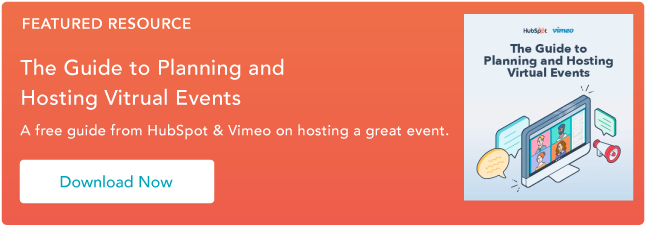Are you planning a virtual event and not sure which platform to use?
From large platforms like Hopin to smaller, more niche platforms, we’ve got you covered. Check out our list of the 10 best platforms to host your next virtual event.
- What is a virtual event platform?
- Key Features to Look For in a Virtual Event Platform
- Best Virtual Event Platforms
You might be wondering, is a virtual event platform the same as a video conferencing platform like Zoom? Technically no. Although both tools will have features that intersect, they are designed for different purposes.
A virtual event platform is designed to scale, and offer immersive experiences and interactive elements meant to simulate in-person events. A video conferencing platform, on the other hand, is unlikely to support interactive features beyond chatrooms and breakout rooms, as their main focus is video conferencing.
Key Features to Look for in Virtual Event Platform
If you’re in the market for a virtual event platform, you’ll want to look for one that’s scalable, customizable, and user-friendly.
Here are some key features to look for:
- Pre-event:
- Registration system
- Payment processing
- Event referral tracking
- Email marketing integration
- During the event:
- Polling and Q&A
- Live-streaming
- Moderating
- Gamification
- Captioning and screen reader capabilities
- Large attendee capacity
- Multi-camera options
- Post-event:
- Analytics dashboard
- Customizable CTAs
- Data exports
While this list isn’t comprehensive, it’s a great place to start as you determine what you’re looking for and what you can expect to find from virtual event platforms on the market.
Best Virtual Event Platforms
1. vFairs
Ranked #1 on G2 with over 1,300 reviews, vFairs is one of the best virtual event platforms in the market.
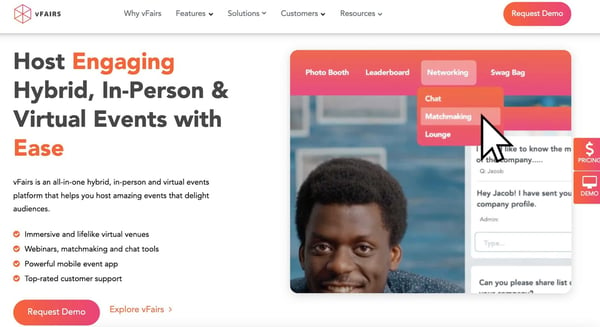
As its name suggests, this virtual event platform specializes in fairs, such as career, job, education fairs, and trade shows. Their solutions include:
- Virtual exhibit hall
- Custom event builder
- Event gamification
- Analytics and reporting tools
In addition to virtual events, they also host in-person and hybrid events, which is great for brands looking for a multi-channel approach.
2. Hopin
As one of the leading virtual event platforms on the market, Hopin is suitable for both small and large events.
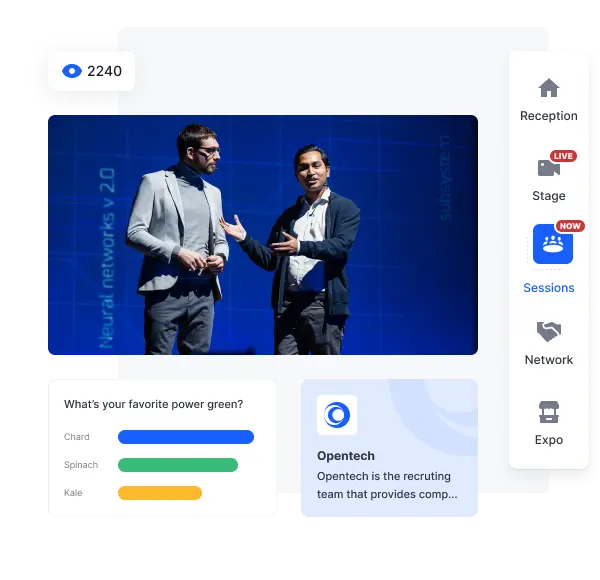
Hopin offers a flexible and scalable platform with everything you will need for your event, from registration support to multi-stage sessions to real-time analytics.
Even the free plan offers unlimited events for up to 2 hours with customizable registration, analytics, and multi-venue options.
If you’re looking for a platform that will grow with you, this is a great option.
3. Airmeet
Looking for an approachable, unfussy solution for your virtual events? Then, Airmeet is worth a look.
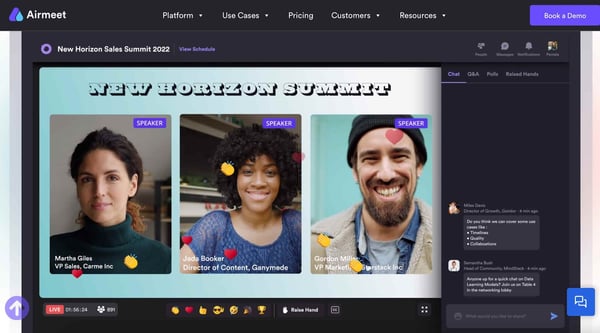
With a 4.6/5 rating on G2 out of 549 reviews, Airmeet is a user-friendly platform that works for just about any event. It’s been used by some of the top brands out there, like Forbes, Walmart, and FedEx, yet offers packages that work for businesses of any size.
While they have the top features you’d expect from a virtual event platform, they stand out for their platform’s ease of use.
4. GoToWebinar
GoTo Webinar is the go-to hosting platform for webinars. Whether you’re doing a product demo or conducting employee training, this tool is a great option. 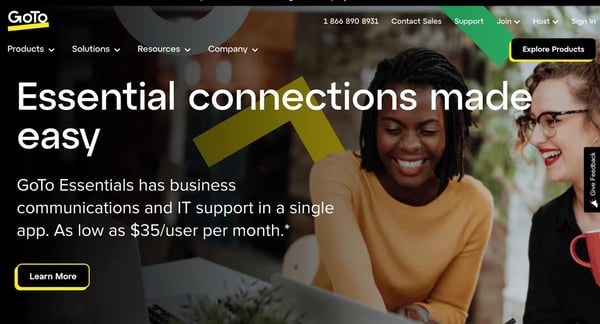
Their pricing starts at $49/month and goes up to $499 for enterprises. Every plan includes reporting and analytics, registration tools, and event-related email marketing.
Some of the most interesting features on the platform include:
- Pre-recorded webinars that still include interactive elements, like polls, Q&As, surveys, and handouts
- Multi-device functionality
- Integration with CRMs, Google Suite, Microsoft Teams, and more
5. Remo
Have a unique vision for your virtual event? Remo will help you bring it to life to your exact specifications.
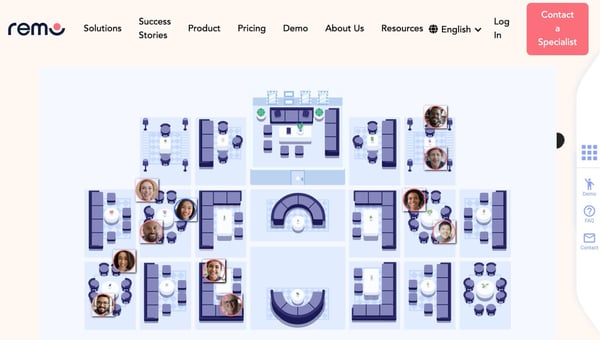
Remo allows you to create an entire virtual world for your attendees that will keep them engaged and entertained. Their standout feature is the ability to create custom floor plans so that you personalize your attendees’ experience.
6. Goldcast
If you’re a B2B business, Goldcast is the virtual event platform designed specifically for you.
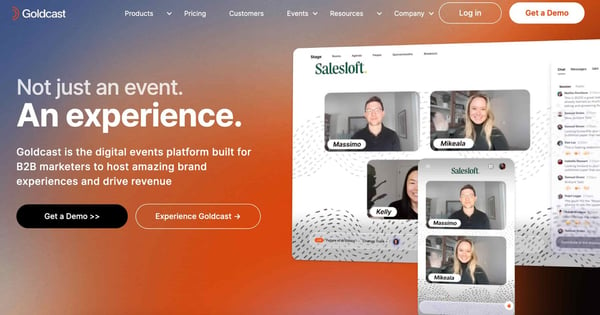
Their platform is trusted by some of the biggest B2B brands including GitHub, Salesloft, Hootsuite, and Drift. Here are a few reasons why:
- Simple and user-friendly interface for non-technical users
- Frictionless CRM integration
- Dedicated support teams
- Advanced production tools
- Hybrid capabilities
7. Hubilo
If you want to be hands-on in building your virtual event, consider Hubilo.
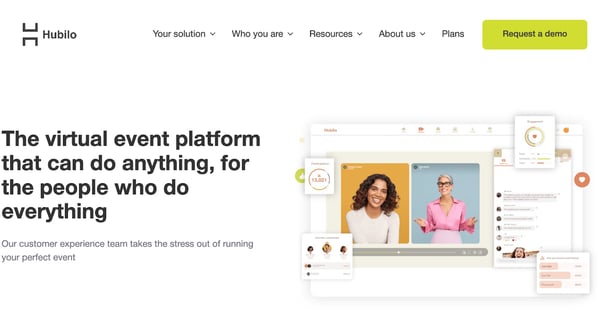
Many call it a DIY platform, as it has extensive customization features on the front and back end. What’s more, it offers global support for users looking to create engaging in-person, hybrid, and virtual events.
Hubilo is best known for its client support, custom branding options, and extensive engagement features.
8. Zuddl
Awarded “Best Support” for small businesses by G2, Zuddl is definitely worth a look if you’re in the market for a virtual event platform.
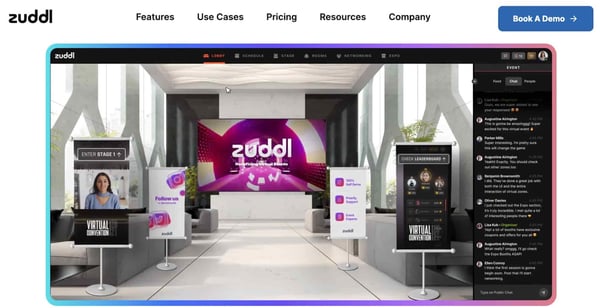
Although they offer the standard features you see on many platforms, they focus on three things: customization, ease of use, and branding.
Zuddl allows brands to create immersive, on-brand virtual experiences that invite attendees to connect. Here’s how they do it:
- Easy-to-use templates, widgets, and landing pages for branding
- Tier-based matchmaking, breakout rooms, and virtual business cards for networking
- Live leaderboards for gamification
These are just some of the tools Zuddl has to offer.
9. ON24
While other platforms focus on customization, ON24 promises to deliver on attendee engagement.
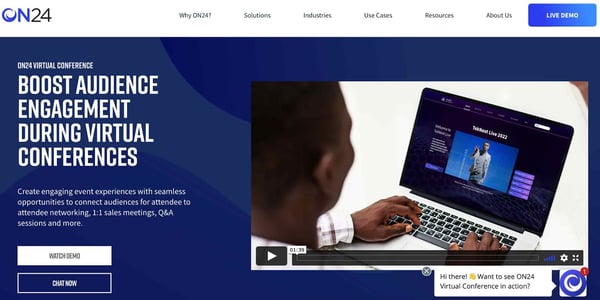
They focus on creating rich, interactive virtual experiences while also collecting valuable insights that you can leverage long after the event is over.
With ON24, you can create:
- Live or semi-live webinars
- Engaging roundtable events with video-first participation
- High-converting landing pages
- Accessible events that welcome global audiences
10. Accelevents
From tradeshows and fundraisers to product launches and career fairs, Accelevents does it all.
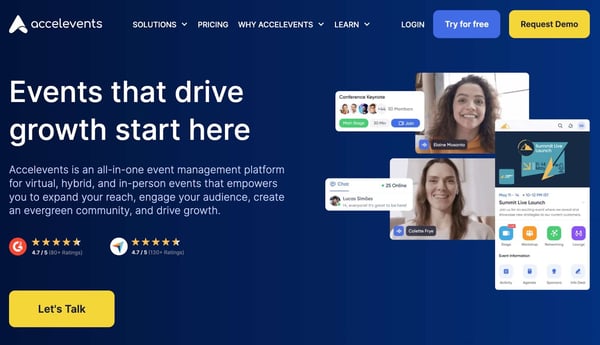
They offer a 360 virtual event experience for businesses looking for a sleek interface as well as audience engagement. Key features include:
- Integrated live streaming
- Lobby interaction, such as welcome videos, activity walls, and leaderboards
- Analytics dashboard with registration and session reports
- Custom booths and expo halls for sponsors
In addition, Accelevents is on Capterra’s 2022 shortlist for “Emerging Favorite” in the virtual event software category, with an overall rating of 4.7/5.
So there you have it — our top 10 virtual event platforms. This list should help you narrow down your choices for hosting your next digital event.
![]()


